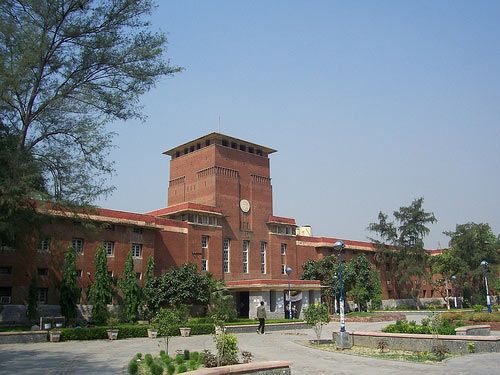
Students and teachers at Delhi University express shock at the recent case of alleged sexual harassment of a PhD scholar by a St Stephen’s College professor, but it has hardly surprised anyone on the university campus.
Upasna Pandey/ Rediff.com spoke with senior professors and students who pointed out the inherent flaws in the existing sexual harassment grievance redressal mechanism at the institution and university level.
They cite that the internal complaints committees, which are created to deal with such cases, need to have `higher autonomy’ and students need to be represented in these committees, to ensure effectiveness.
“At the outset, the approach is usually about dissuading the victim from lodging formal complaints. There is a strong patriarchal mindset which works across those who manage the institutions and even those who are part of the ICC. It is assumed that the complainant has an ulterior motive for voicing the complaint,” said a senior professor who has been part of the ICC at the university. He spoke on condition of anonymity.
He added that the investigations on such complaints are conducted by the ICCs but the final findings are not even communicated “properly to the complainant.”
In the recent case, the PhD student complainant told Rediff.com that she wants to “complete her PhD without any loss of time or interruption, due to the complaint.
“I want justice and hope that the accused person as well as the St Stephens’ principal, who also misguided me, face action,” she added.
The complainant has alleged that the assistant professor, Satish Kumar, had harassed her for two years. She claims that the professor had sexually assaulted her in October, 2013 and she reported the matter to the DU chemistry department but there was little action on the complaint.
She later took the issue to the St Stephen’s college principal Valson Thampu, who is reported to have sent this for investigation to the ICC.
“The principal misguided me, he asked me to write application describing my complaint as an ‘academic’ issue instead of a case of sexual harassment,” alleges the complainant.
This incident has brought to the fore the issue of harassment of PhD students at hands of supervisors, in varied forms.
“There is a strong power and command which supervisors hold over the PhD students. In case of incidents of harassment, a supervisor may stop guiding the student properly, delay reports, feedbacks, deny approvals, hold back or deny reference letters for attending relevant conferences, other opportunities for the student, leading to critical loss of time. Even after the PhD is completed, students need references from supervisors for job applications,” said a doctoral student, who did not wish to be identified.
This apart, in the science and technology stream, there is “more scope for harassment as students need to spend more time with the supervisors during experimentation stage and for lab related activities. This makes them (girl students) more vulnerable,” added the student.
The HRD ministry has sent a notice to Delhi University seeking a report in the St Stephen’s College professor molestation case and the principal is reported to have sent a status report on the same to the DU.
He reportedly informed that while the matter was reported to the college's ICC and the girl had also forwarded a complaint to the university's chemistry department.
When asked to respond on how effective the ICC was in dealing with cases of sexual harassment grievances, DU spokesperson Malay Neerav said, “The varsity is mandated to act in accordance with the Sexual Harassment at the Workplace Act (2013). I would not like to comment on the role or effectiveness of ICC.”
“Prior to the Sexual Harassment of Women at Workplace (Prevention, Prohibition and Redressal) Act, 2013, there was Ordinance XV-D, which was functional in DU, in wake of the Vishakha Guidelines for prevention of sexual harassment introduced by the Supreme Court. Under this, the ICC had a total of nine elected members, which included three student representatives, two non-teaching employees, two teachers, one chairperson (which was mandated to be a woman) and two external independent members,” said another senior DU professor.
“It is true that it didn’t work too well also. This is primarily because the accused are usually individuals who hold authority and in some cases, they would be let off with minimal punishment like a verbal apology to the college governing body, which is of no consequence. Now, the ICC has nominated members and there is no student representation at all,” he added.
“The St Stephen’s case is not the first case and there have been such cases earlier also, and this will continue. Not much has been done on gender equality sensitisation among DU employees and office bearers. If Delhi police can initiate such trainings for its workforce, it is important that a high population body like the university also proactively initiate this, if we are serious on the issue of sexual harassment,” said a DU Teachers Association member.










 © 2025
© 2025